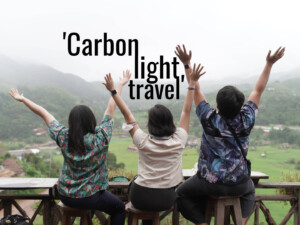Footprints: What does it mean for travel & tourism to be carbon neutral?

Carbon neutral travel & tourism. Net-zero travel. Zero-carbon tourism. Carbon footprint(s). Footprint size. Footprint depth.
Be careful where you step for the whole landscape is a potential minefield … locally, nationally, and globally … as we navigate climate and climate change.
Kevin Phun of “GT” Partner the Centre for Responsible Tourism Singapore carefully touches on all of this in his second “Good Tourism” Insight.
The travel & tourism industry’s carbon journey will be interesting. And it will inevitably expand our understanding of what being “carbon neutral” or “zero-carbon” entails.
Calculating tourism’s carbon footprint may not always be easy. Different locations produce carbon in different ways. And different tourism activities also contribute to carbon emissions differently. When calculating a footprint’s size we should also consider its depth; its impacts on people and the environment. That too will vary from place to place.
The tourism industry as a whole is indeed guilty of producing a very big carbon footprint; from manufacturing to transport to dining. The tourism industry is therefore perhaps one of the more appropriate industries to examine the varying depths (impacts) of carbon footprints; that is not just how many tonnes is emitted but how much good or bad this means for local people and places compared to other people and places.
Many different carbon footprints
Doubtless, the tourism industry must see more carbon reduction projects; in-house within each business, and externally across sectors and supply chains.
Travel & tourism’s different sectors must find ways to engage stakeholders internally to reduce their carbon footprints and also externally with other sectors to reduce the carbon footprint of tourism as a whole. Partnerships must be formed to explore ways to identify and reduce the depth or impact of travel & tourism’s collective carbon footprint.
It is important to assess the tourism supply chain to have an idea what the depth of travel & tourism’s carbon footprint is. This must include the informal sector, such as small transport operators, suppliers working with the accommodation sector, food and beverages, souvenirs, clothing, etc.
Reducing carbon emissions in tourism could have beneficial effects on other parts of the local economy. Efforts to reduce the carbon footprint of tourism may bring back manufacturing jobs to places that now outsource the production of souvenirs, for example. Thus we may end up with tourists buying more authentic home-grown products made from local ingredients and materials. The opposite too may be true as policies and regulations in other industries are strongly felt by travel & tourism operators.
While we should welcome carbon reduction projects, we must be mindful of what they will do to tourist experiences and therefore our tourism product.
Tourism in less developed countries may sometimes produce a larger carbon footprint than in more developed nations as the technologies and methodologies in use may not be as modern. And that might be okay for a while at least if less globalisation reduces the carbon footprint of tourism as a whole. And it could be good news for local economic development, as more focus and support will be on encouraging tourism companies to buy and use local. Decarbonisation could then catch up.
What are the full implications of attempting to be carbon neutral or zero-carbon? Will travel & tourism be an even more controversial part of the global economy as it intensifies its efforts towards these goals? Will greenwashing be harder to get away with?
The depth of carbon footprints
Carbon-related impacts should be the purview of the travel & tourism industry since it claims to be concerned with the ethical implications of the presence and actions of tourists. Knowing that a carbon footprint is, say, 12 tonnes is not good enough. What that 12 tonnes means to a community of people is more important.
How to calculate the size of a carbon footprint is already a contested topic locally, let alone internationally. Carbon footprint calculation for something like the travel & tourism industry is even more complicated. Consider how some businesses only partially rely on tourists, for example.
And, if we start talking about the depth or the impacts of a carbon footprint, it is even harder to calculate. This difficulty may spur new ways to assess how much impact carbon emissions have on local people and the environment, or at least trigger greater awareness that more discourse is needed.
Is travel & tourism becoming less efficient per person?
Greater efficiency will be key to becoming carbon neutral. Unfortunately, efficiency in tourism is not always an easy thing to understand, especially as sought-after travel experiences and destinations move away from the mass, predictable, and therefore highly “efficient” consumption patterns we have been used to. Ironically, while this trend may contribute to reducing the carbon footprint of tourism as a whole, the per person emissions may in fact rise and/or become harder to reduce.
Personalised, unique, and experiential travel will mean that we lose the means to objectively calculate carbon emissions when delivering experiences. Self-reporting will be increasingly relied upon. Thus it may not be possible for some tourism experiences related to cultural heritage to be carbon-free at all.
All sorts of emerging tourism trends add to the complexities of calculating carbon footprints and achieving carbon neutrality.
The informal sector may lose out
Calculating a carbon footprint and aiming to be net-zero or zero-carbon may mean that the informal sector, which is prominent in many developing and less developed countries’ travel & tourism industries, might lose out. While some locals may have greater opportunities due to the industry turning to cleaner energy, many others may be edged out.
Partnerships, collaborations, & complex calculations
Wherever travel & tourism operates, there will have to be more public sector-led funding in areas like technology adoption and transfer. In hard-to-reach places, opportunities to eliminate or offset carbon might be more difficult, and may require partnering with local indigenous people. Totally new ideas may be needed to enable any elimination or offsetting at all.
Would carbon neutral initiatives help or hinder people in such places?
Certainly most stakeholders everywhere will want to avoid, or at least better manage mass tourism. In addition to changing consumer mindsets, calculating carrying capacities will be critical. But, as we can see with carbon footprints, it goes against the idea of sustainability to adopt simplistic calculations.
Agree? Disagree? Share your reasons in the comments below. Or write a “GT” Insight. The “Good Tourism” Blog welcomes diversity of opinion about our travel & tourism industry because travel & tourism is everyone’s business.
Featured image (top of post): Kids leave footprints in the sand as they walk along the beach. Image (CC0) via pxfuel.
About the author

Kevin Phun is a specialist in responsible tourism who combines tourism and sustainable development knowledge and expertise. He is the founder of the Centre for Responsible Tourism Singapore (CRTS) and can be reached at kevin[at]crts.asia.






